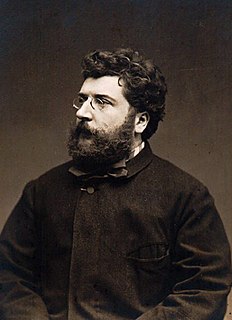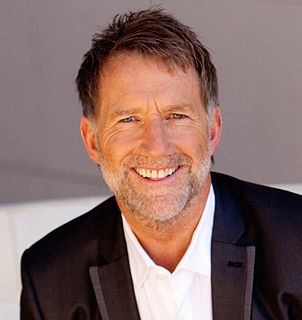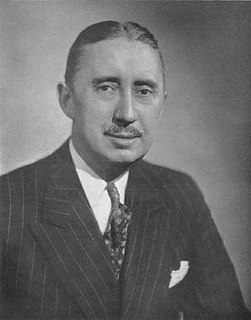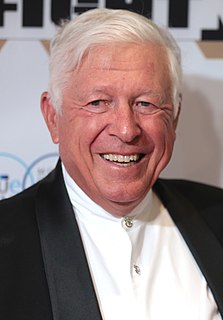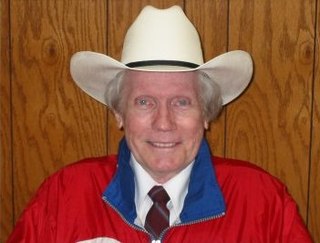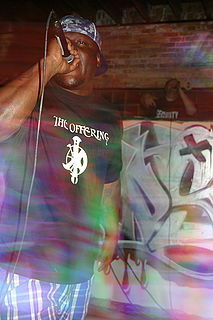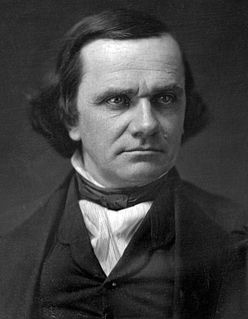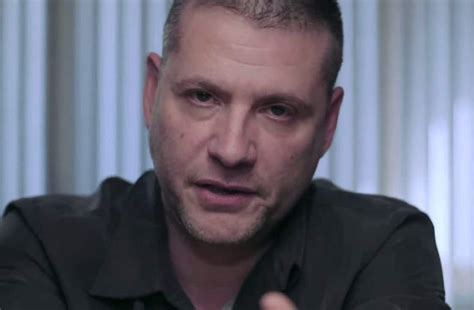Top 1200 Religious Leaders Quotes & Sayings - Page 17
Explore popular Religious Leaders quotes.
Last updated on November 18, 2024.
The issue of religious liberty is absolutely critical. America was founded on three different types of liberty: political liberty, economic liberty, and religious and civil liberty. It's remarkable that, one-by-one, these strands of liberty are coming under fierce attack from the Left. And that's particularly ironic because "liberal" derives from a word which means "liberty," the free man as opposed to the slave. This liberalism which we're saddled with today isn't a real liberalism at all, but a gangster style of politics masquerading as liberalism.
In its main features the Declaration of Independence is a great spiritual document. It is a declaration not of material but of spiritual conceptions. Equality, liberty, popular sovereignty, the rights of man - these are not elements which we can see and touch. They are ideals. They have their source and their roots in the religious convictions. They belong to the unseen world. Unless the faith of the American people in these religious convictions is to endure, the principles of our Declaration will perish. We can not continue to enjoy the result if we neglect and abandon the cause.
I don't want to write a mass before being in a state to do it well, that is a Christian. I have therefore taken a singular course to reconcile my ideas with the exigencies of Academy rules. They ask me for something religious: very well, I shall do something religious, but of the pagan religion. . . . I have always read the ancient pagans with infinite pleasure, while in Christian writers I find only system, egoism, intolerance, and a complete lack of artistic taste.
A leader always has one major message, and this weaves into everything he or she does. It remains the primary focus. A leader is to some degree a prophet, a person with a message. Great leader [sic] see things that others don’t. They preach it until others can see it as well. Their message supports the mission. A leader is a preacher, a person who communicates the fire of the mission. Not all preachers are leaders, but all great leaders will be preachers of one sort or another.
Habit must play a larger place in our religious life. We worship when we feel like it, we pray when we feel like it. We read the Bible when we feel like it. Leaving our religious exercises to the promptings of impulse, we become creatures of impulse rather than soldiers of Christ. An army made up of creatures of impulse would be only a mob. So is a church.
Trust is perhaps the most critical single building block underlying effectiveness. Without trust leaders do not have followers. Without trust, leaders are impotent despite great rhetoric or splendid ideas. Trust rests on the belief among followers that the leader is transparent: What you see is what there is. Trust means followers believe there is no duplicity; no manipulation just to satisfy the leader's ego. Very simply: The effective leader is transparent; that's why that person is trusted.
Market bashers ... might understand the claim that in some particular field, markets required no intervention--though they'd be skeptical--but the notion that, on general principle, complex systems ran themselves just fine without benign intervention seemed like it could only be the product of a quasi-religious faith. ... Of course, this gets things almost precisely backwards. It is the idea that all order must be explained by a functioning mind at the helm, not its denial, that has the closet affinity to the religious instinct.
What does Christianity mean today? National Socialism is a religion. All we lack is a religious genius capable of uprooting outmoded religious practices and putting new ones in their place. We lack traditions and ritual. One day soon National Socialism will be the religion of all Germans. My Party is my church, and I believe I serve the Lord best if I do his will, and liberate my oppressed people from the fetters of slavery. That is my gospel.
The essential contradiction at the heart of America's problems: if we were a democracy and if we truly enjoyed free speech, we would be able to study and speak about the CIA. We would confront our institutionalized racism and sadism. But we can't, and so our agency's history remains unknown, which in turn means we have no idea who we are, as individuals or as a nation. We imagine ourselves to be things we are not. Our leaders know bits and pieces of the truth, but they cease being leaders once they begin to talk about the truly evil things the CIA is doing.
If you are really spontaneous, people will think you are mad. If you go to a tree and start talking, or to a flower, people will think you are mad. If you go to a church and talk to a cross or to an image, nobody will think your are mad, they will think that you are religious. You are talking to a stone in a temple and everybody thinks you are religious because this is the authorized form.
One of the things that sets the Bible apart from all other ancient religious writings is its scientific accuracy. Without exception, every other ancient religious writing contains certain scientific errors. For example, Muhammad taught in the Qur'an that the sun descends down into a muddy spring. The Hindu Vedas state that the Earth is flat and triangular, that earthquakes are caused by elephants shaking themselves under it. You'll never read absurd statements like those in the Bible.
Owing to the identification of religion with virtue, together with the fact that the most religious men are not the most intelligent, a religious education gives courage to the stupid to resist the authority of educated men, as has happened, for example, where the teaching of evolution has been made illegal. So far as I can remember, there is not one word in the Gospels in praise of intelligence; and in this respect ministers of religion follow gospel authority more closely than in some others.
We have gone a long way toward civilization and religious tolerance, and we have a good example in this country. Here the many Protestant denominations, the Catholic Church and the Greek Orthodox Church do not seek to destroy one another in physical violence just because they do not interpret every verse of the Bible in exactly the same way. Here we now have the freedom of all religions, and I hope that never again will we have a repetition of religious bigotry, as we have had in certain periods of our own history. There is no room for that kind of foolishness here.
Agile leaders encourage their teams to adjust and experiment constantly. In today's age of oversharing, the best leaders also have to be more open and accessible. To be effective, you also have to be aware of how others perceive you and cop to your flaws every now and then. One of the lesson to successful leadership may be quite challenging but very important. Expose yourself. Allow yourself to be vulnerable - less super and more human. These "Leadership 3.0" practices, as I call them, are critical to being an effective manager when you're getting started in today's world.
The lessons of religious toleration - a toleration which recognizes complete liberty of human thought, liberty of conscience - is one which, by precept and example, must be inculcated in the hearts and minds of all Americans if the institutions of our democracy are to be maintained and perpetuated. We must recognize the fundamental rights of man. There can be no true national life in our democracy unless we give unqualified recognition to freedom of religious worship and freedom of education.
If enough people are sensitive to the tragedy of Tibet, I think it will produce a change politically as well. But furthermore, it's important for the people in Tibet. Now communication is such [that] people know what is happening. Even Tibetan people would know that the Interfaith or the international group of religious people - that everybody who is religious is taking up their cause. It would help them a lot if we give them courage, and that in itself is enough.
The courts demand that every religious person must accommodate a single atheist who might be 'offended' at the favorable mention of God's name. But no atheist can be forced to accommodate a single religious person who might be offended by the atheist's unbelief, or who wants to be part of the pluralism and diversity about which liberals regularly speak, but which is not broad enough to embrace people who believe in God.
If Muslims want to take their disputes to religious arbitrators because they genuinely believe that it's a matter of great spiritual importance that they do that, they shouldn't be the only community in this country that's denied the opportunity to do that. Because the Jewish population has been entitled to take their disputes to tribunals known as the Beth Din for over one hundred years, and the Church of England is integrated into the fabric of this country, and there are ecclesiastical tribunals where religious disputes can be dealt with.
Way down deep the American people are afraid of an entangling relationship between formal religions - or whole bodies of religious belief - and government. Apart from constitutional law and religious doctrine, there is a sense that tells us it's wrong to presume to speak for God or to claim God's sanction of our particular legislation and his rejection of all other positions. Most of us are offended when we see religion being trivialized by its appearance in political throw-away pamphlets.
We live in a very low state of the world, and pay unwilling tribute to government founded on force. There is not, among the most religious and instructed men of the most religious and civil nations, a reliance on the moral sentiment, and a sufficient belief in the unity of things to persuade them that society can be maintained without artificial restraints, as well as the solar system; or that the private citizen might be reasonable, and a good neighbor, without the hint of a jail or a confiscation.
I believe in an America that is officially neither Catholic, Protestant nor Jewish; where no public official either requests or accepts instructions on public policy from the Pope, the National Council of Churches or any other ecclesiastical source; where no religious body seeks to impose its will directly or indirectly upon the general populace or the public acts of its officials; and where religious liberty is so indivisible that an act against one church is treated as an act against all.
Homosexuals now pervade and control American government at every level and branch. Thus, only those churches that support and promote the militant homosexual agenda enjoy religious freedom. Any church in America that dares to preach what the Bible says about soul-damning, nation-destroying moral filth of the vile homosexual beasts among us, loses all Constitutional guarantees of religious freedom and speech rights.
I think, unfortunately, many opinion leaders in Germany - including government officials, politicians, social service bureaucrats and so forth - they are in the private system, and they get paid the private insurance by their employer. So for them this is the best of two worlds: They have some more expensive and privileged access, but they do not have to pay for it themselves. This is a system which is both inefficient and unfair at the same time, but it is defended by those who profit from this system, and this includes many opinion leaders and many politicians.
When the Jews were being persecuted by the Nazis in 1944 we passed the War Refugee Act, which focused on rescuing Jews, a religious group. But if the religious group is the subject of the persecution based on their religion, it's perfectly OK for a First Amendment-bound society to emphasize their rescue, just as it is perfectly OK to emphasize the fact that many, if not all of the perpetrators of Islamic terrorism, come from countries with a history of supporting terrorism.
I never try to be religious. I never try to be any type of religious cat. Spiritual, yes, but religion, when you get into that you get into a category where you lock yourself in and people look at you a certain way and then they become that way. Nah, I'm still an MC, I'm an MC first. People try to figure out my origin, at the end of the day it's just clever songs.
No civilisation can grow unless fanatics, bloodshed, and brutality stop. No civilisation can begin to lift up its head until we look charitably upon one another; and the first step towards that much-needed charity is to look charitably and kindly upon the religious convictions of others. Nay more, to understand that not only should we be charitable, but positively helpful to each other, however different our religious ideas and convictions may be.
Increasingly, our leaders must deal with dangers that threaten the entire world, where an understanding of those dangers and the possible solutions depends on a good grasp of science. The ozone layer, the greenhouse effect, acid rain, questions of diet and heredity. All require scientific literacy. Can Americans choose the proper leaders and support the proper programs if they themselves are scientifically illiterate? The whole premise of democracy is that it is safe to leave important questions to the court of public opinion - but is it safe to leave them to the court of public ignorance?
We all agree that neither the Government nor political parties ought to interfere with religious sects. It is equally true that religious sects ought not to interfere with the Government or with political parties. We believe that the cause of good government and the cause of religion both suffer by all such interference.
We, the Black masses, don't want these leaders who seek our support coming to us representing a certain political party. They must come to us today as Black Leaders representing the welfare of Black people. We won't follow any leader today who comes on the basis of political party. Both parties (Democrat and Republican) are controlled by the same people who have abused our rights, and who have deceived us with false promises every time an election rolls around.
When you coach and teach leadership, most people think about them. It's like you're the leader and how do you influence them. Clearly, leaders do take their followers, their flock, their enterprise, their business - whatever - hopefully to a better place. But I think the foundation of what makes really great leaders is they lead themselves, and they're conscious about knowing themselves and coaching and leading themselves in a very profound way. The simplest of us talk to ourselves. The question is, "Do we really lead ourselves?"
I ask you and all the leaders of the world: Would you act differently, would you keep silent and do nothing if you were in our place? Would you not resist if you were allowed no rights in your own country because the color of your skin is different to that of the rulers, and if you were punished for even asking for equality? I appeal to you, and through you to all the countries of the world, to do everything you can to stop the coming tragedy. I appeal to you to save the lives of our leaders, to empty the prisons of all those who should never have been there.
Is the appointment of Chaplains to the two Houses of Congress consistent with the Constitution, and with the pure principle of religious freedom? In strictness the answer on both points must be in the negative. The Constitution of the U. S. forbids everything like an establishment of a national religion. The law appointing Chaplains establishes a religious worship for the national representatives, to be performed by Ministers of religion, elected by a majority of them, and these are to be paid out of the national taxes. Does this not involve the principle of a national establishment ... ?
Our knowledge of the historical worth of certain religious doctrines increases our respect for them, but does not invalidate our proposal that they should cease to be put forward as the reasons for the precepts of civilization. On the contrary! Those historical residues have helped us to view religious teachings, as it were, as neurotic relics, and we may now argue that the time has probably come, as it does in an analytic treatment, for replacing the effects of repression by the results of the rational operation of the intellect.
Politics is different than movies. Politics are controlled by leaders. Leaders of every country have different interests. And they try to explain to their people why they should take one side or the other side. But in the movie its doing the opposite. It allows you to have a Universal Experience. You don't watch it as politics but as a movie. You don't have different reactions all over. It's so universal a language. It's not a political language serving a political agenda. The language of cinema is a world language. With the Hollywood movie, it brings about the same reaction wherever it goes.
Half the people in the world think that the metaphors of their religious traditions, for example, are facts. And the other half contends that they are not facts at all. As a result we have people who consider themselves believers because they accept metaphors as facts, and we have others who classify themselves as atheists because they think religious metaphors are lies.
A comprehensive doctrine, either religious or secular, aspires to cover all of life. I mean, if it's a religious doctrine, it talks about our relation to God and the universe; it has an ordering of all the virtues, not only political virtues but moral virtues as well, including the virtues of private life, and the rest. Now we may feel philosophically that it doesn't really cover everything, but it aims to cover everything, and a secular doctrine does also.
There are two kinds of comprehensive doctrines, religious and secular. Those of religious faith will say I give a veiled argument for secularism, and the latter will say I give a veiled argument for religion. I deny both. Each side presumes the basic ideas of constitutional democracy, so my suggestion is that we can make our political arguments in terms of public reason. Then we stand on common ground. That's how we can understand each other and cooperate.
The interesting thing about the religious component, for me, is that Jesus hardly mentions sex at all. He's pretty interested in the poor, he's pretty interested in selling your worldly goods and storing up riches in heaven. However, religious fundamentalists have made it all about sex, and that's like saying, "Look at the sex and we're just not going to talk about what you may be doing in a financial way that is sinful."
The exclusion of true esoteric religion has been the business of the State since ancient times. At first this was done via the establishment of the popular idealism of exoteric religious institutions in league with the State. But in modern times the same process is done by the strategic exclusion of conventional religious cultism, mystical idealism, and higher evolutionary Wisdom from the mechanisms of popular culture.
We now demand glamour and fast-flowing dramatic action. A generation of Christians reared among push buttons and automatic machines is impatient of slower and less direct methods of reaching their goals...The tragic results of this spirit all all about us: shallow lives, hollow religious philosophies...the glorification of men, trust is religious externalities....salesmanship methods, the mistaking of dynamic personality for the power of the Spirit. These and such of these are the symptoms of an evil disease.
I am now speaking of rights under the Constitution, and not of moral or religious rights. I do not discuss the morals of the people of Missouri, but let them settle that matter for themselves. I hold that the people of the slaveholding States are civilized men as well as ourselves, that they bear consciences as well as we, and that they are accountable to God and their posterity and not to us. It is for them to decide therefore the moral and religious right of the slavery question for themselves within their own limits.
In order to teach a course in the history of Western religious thought, I had to do a great deal of research in the writings within the Judaic and Christian traditions and I was astonished to find in those writings philosophical thought of great power and sophistication. These writings completely blew away all my opinions about what I had taken to be the irrationality or immaturity of religious ideas, opinions which were and still are fashionable in many intellectual and literary circles today.
The issues which today confront the nation are clearly defined and so fundamental as to directly involve the very survival of the Republic. Are we going to preserve the religious base to our origin, our growth and our progress, or yield to the devious assaults of atheistic or other anti-religious forces? Are we going to maintain our present course toward State Socialism with Communism just beyond or reverse the present trend and regain our hold upon our heritage of liberty and freedom?
and while faith based on theological reasoning is today universally engaged in a bitter struggle with doubt and resistance from the prevailing brand of rationalism, it does seem that the naked fundamental experience itself, that primal seizure of mystic insight, stripped of religious concepts, perhaps no longer to be regarded as a religious experience at all, has undergone an immense expansion and now forms the soul of that complex irrationalism that haunts our era like a night bird lost in the dawn.
If no one had ever challenged religious authority, there’d be no democracy, no public schools, women’s rights, improvements to science and medicine, evolution of slavery and no laws against child abuse or spousal abuse. I was afraid to challenge my religious beliefs because that was the basis of creation—mine anyway. I was afraid to question the Bible or anything in it, and when I did, that’s when I became involved with PFLAG and realized that my son was a perfectly normal human being and there was nothing for God to heal because Bobby was perfect just the way he was.
In some of the classes, especially the introductory religion courses I took, the professors can veer into a particular strain of religious anti-intellectualism. Professors typically aren't given tenure at Liberty, so there's pressure to hew to the party line on religious and social issues. I didn't see a whole lot of my professors encouraging critical thinking among their students. Which isn't to say that students don't engage critical thinking skills at Liberty - just that it wasn't part of my classroom experience there.
According to my religious belief, I'm sorry if you feel like I'm pushing this on you - my religious belief is that you behave the way God wants us to behave. And that's simply love God and love one another. If we did that, there would be no need for any of the other commandments. It would be great. But in the same vein, we would have obtained paradise by that point. And it's tougher to get to paradise by that point.
I think leaders lead themselves, but leaders have ideas and maybe they're visionary ideas. Probably today, people would say Steve Jobs was a visionary because he invented this little gadget, the cell phone. But he didn't invent cell phones, and he didn't design the cell phone. He just took a couple of ideas and put them together, and no one else put those same ideas together as successfully as he did. But he had something that he was trying to do that intrigued him, and he could do it very well.
As Elder George F. Richards, President of the Council of the Twelve, said in a conference address in April 1947, 'when we say anything bad about the leaders of the Church, whether true or false, we tend to impair their influence and their usefulness and are thus working against the Lord and his cause.' ... The Holy Ghost will not guide or confirm criticism of the Lord's anointed, or of Church leaders, local or general. This reality should be part of the spiritual evaluation that LDS readers and viewers apply to those things written about our history and those who made it.
There are only three kinds of people. LEADERS. Those who take charge, build, inspire, and create. FOLLOWERS. Those who support leaders and work to achieve mutually beneficial goals.... [and] DESTROYERS. Destroyers cannot find it within themselves to follow anyone, their hatred and insecurity is too pure to see strength in any OTHER being. The utterly lack the ability to inspire or create, so they do the only thing left to them -- they tear down all they come in contact with.
In order to succeed we need leaders of inspired idealism, leaders to whom are granted great visions, who dream greatly and strive to make their dreams come true; who can kindle the people with the fire from their own burning souls. The leader for the time being, whoever he may be, is but an instrument, to be used until broken and then to be cast aside; and if he is worth his salt he will care no more when he is broken than a soldier cares when he is sent where his life is forfeit in order that the victory may be won.
What really worries me is that those who are in positions of power are not really affected by what we are writing. In the moral dialogue you want to start, you really want to involve the leaders. People ask me: "Why were you so bold as to publish A Man of the People? How did you think the Government was going to take it? You didn't know there was going to be a coup?" I said rather flippantly that nobody was going to read it anyway, so I wasn't likely to be fired from my official position. It's a distressing thought that we cannot engage our leaders in the kind of moral debate we need.
I think our responsibility as political leaders today, is to push our economic leaders to change their investment behavior, to decide new things, and to help workers to change their jobs. And I think the mistake that Donald Trump decided to make is exactly the mistake we made in France and in Europe. Which was to resist to the change in order to protect the old jobs. What we have to protect is people, not jobs. If you want to protect people, you retrain them.
Common to all these types is the anthropomorphic character of their conception of God. In general, only individuals of exceptional endowments, and exceptionally high-minded communities, rise to any considerable extent above this level. But there is a third stage of religious experience which belongs to all of them, even though it is rarely found in a pure form: I shall call it cosmic religious feeling. It is very difficult to elucidate this feeling to anyone who is entirely without it, especially as there is no anthropomorphic conception of God corresponding to it.


